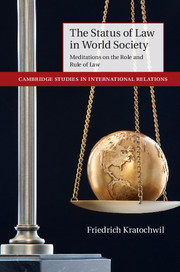Book contents
- Frontmatter
- Dedication
- Epigraph
- Contents
- Preface
- Introduction: images of law
- Meditation 1 Inter-disciplinarity, the epistemological ideal of incontrovertible foundations, and the problem of praxis
- Meditation 2 On the concept of law
- Meditation 3 On constitutions and fragmented orders
- Meditation 4 Of experts, helpers, and enthusiasts
- Meditation 5 The power of metaphors and narratives: systems, teleology, evolution, and the issue of the “global community”
- Meditation 6 Cosmopolitanism, publicity, and the emergence of a “global administrative law”
- Meditation 7 The politics of rights
- Meditation 8 The limits and burdens of rights
- Meditation 9 The bounds of (non)sense
- Index
- References
Meditation 7 - The politics of rights
Published online by Cambridge University Press: 05 June 2014
- Frontmatter
- Dedication
- Epigraph
- Contents
- Preface
- Introduction: images of law
- Meditation 1 Inter-disciplinarity, the epistemological ideal of incontrovertible foundations, and the problem of praxis
- Meditation 2 On the concept of law
- Meditation 3 On constitutions and fragmented orders
- Meditation 4 Of experts, helpers, and enthusiasts
- Meditation 5 The power of metaphors and narratives: systems, teleology, evolution, and the issue of the “global community”
- Meditation 6 Cosmopolitanism, publicity, and the emergence of a “global administrative law”
- Meditation 7 The politics of rights
- Meditation 8 The limits and burdens of rights
- Meditation 9 The bounds of (non)sense
- Index
- References
Summary
Introduction
Rights, and especially human rights, we are told, are fundamental. They serve as “trumps” in legal arguments and are held to be of universal and trans-historical validity, identifying us as “humans” and not as a member (only) of this or that society. Despite the fact that they appear at a certain time in history, their status is supposed to be based on their “transcendental” nature by either being part of a natural order of things, or by virtue of the fact that they are intuited. They can be “declared” but not “made” as are other laws, even though they need to be formulated to find their way into constitutional texts. Thus rights claims give rise to a specific “rights talk,” which is, in spite of the fiction of its perennial existence, a specific modern phenomenon. It reached one of its peaks by the end of the eighteenth century – after a relatively short incubation period during the English Glorious Revolution – in the American and French Revolutions, and another in the post-Second World War era, particularly since the 1980s. Here the conjuncture of the “rights revolution” led first to the civil rights movement, and then to the adoption of a rights talk by transnational movements that pinpointed gross violations of individual rights by governments worldwide. After the collapse of the main alternative utopia to the Western political project, that is “communism,” the subsequent “silent revolutions” were increasingly fuelled by a “human” rather than merely a “civic” rights discourse.
- Type
- Chapter
- Information
- The Status of Law in World SocietyMeditations on the Role and Rule of Law, pp. 200 - 229Publisher: Cambridge University PressPrint publication year: 2014

